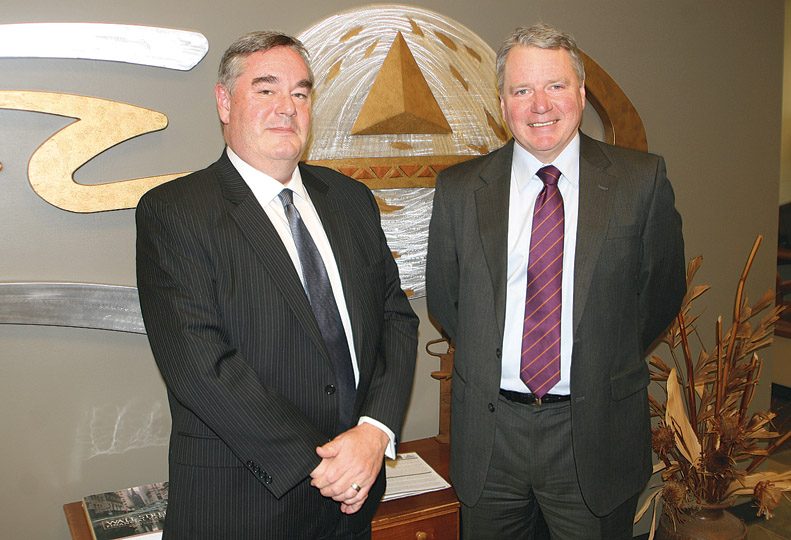
Home » Purcell Systems co-founder Pete Chase launches financing startup
Purcell Systems co-founder Pete Chase launches financing startup
Ousted city planning head Chesney hired by venture

December 4, 2014
Veteran Spokane entrepreneur Pete Chase has started a new venture through which he plans to connect foreign investors with multimillion-dollar developments in the U.S., specifically in Washington state.
As one of his first moves in starting Columbia International Finance LLC, Chase has hired Scott Chesney, the former planning director for the city of Spokane whose forced resignation last month prompted an outcry from the Spokane development community and others.
At Columbia International Finance, Chesney will serve as director of project management.
Chase says he contacted Chesney shortly after hearing he had left the city.
“What we were really lacking was someone to go in and move a project along,” Chase says. “When he became available, he fit well into our plans.”
The company currently shares office space with ICM Asset Management Inc. on the ninth floor of the Chase Financial Center, at 601 W. Main in downtown Spokane. Beyond Chase and Chesney, the company’s only employee is James Palmer, who serves as director of investor relations and is based in the Seattle area. Chase says he expects to hire three people within the next year.
D. Patrick Jones, executive director of Eastern Washington University’s Institute for Public Policy and Economic Analysis, is serving in a consulting role but isn’t an employee.
Chase, who co-founded and led Spokane Valley-based outdoor telecommunications cabinet maker Purcell Systems Inc., incorporated Columbia International Finance in September. He is vetting potential projects to determine which one it will take on first.
The company hopes to decide on a project next month—it’s leaning toward a student-housing project in Western Washington that would cost $7 million to $8 million to develop, Chase says. Once it has decided upon a project, the company will apply to become what’s known as an EB-5 regional center through the U.S. Citizenship and Immigration Services. Through the EB-5 program, a foreign investor can invest in a limited partnership that develops a large project in exchange for the prospect of securing U.S. citizenship.
Columbia hopes to have approval as a regional center and for its first project for which it can use the EB-5 funding mechanism by next June, Chase says. It would expect to have investors lined up and “be able to start writing checks on that first project” in late 2015, he says. By then, he hopes to have one or two additional projects lined up.
One place the company is looking at potential development and redevelopment projects is in the University District east of downtown Spokane. Chase says it will consider private-public partnerships, in addition to private development.
Typically, Chase says, an EB-5 investor would put a minimum of $500,000 toward a multimillion-dollar project that would create jobs in an area designated as typically having high unemployment, known formally as a targeted employment area.
Upon approval of an investment, Chase says, a foreigner investor and immediate family can receive green cards and move to the U.S. After two years, if the project has advanced and fulfilled all of the necessary requirements, that investor and his family can be granted U.S. citizenship.
The investment acts essentially as a low-interest bridge loan, Chase says, and typically after five years, an investor receives money back with a small return.
Columbia International Finance will generate revenue through origination fees on the financing and a margin of the interest. Investors also will pay a fee for Columbia’s guidance through the process.
According to the U.S. Citizenship and Immigration Services website, 31 EB-5 regional centers currently operate in Washington state. Chase says he has been researching EB-5 for two years and has found that most of the regional centers in the state are in Western Washington and were set up by developers to finance a single project.
“We are the only ones, even of those in queue right now, that will use it for economic development,” Chase asserts. “And in the nation, there are only a handful of them” that use the financing mechanism to fund multiple projects.”
Chase says the vast majority of foreign investors are from China, but Columbia International Finance will seek investors from other parts of Asia, as well as the rest of the world.
He says the project manager position that Chesney is filling is a key role in using EB-5 for multiple projects.
“The lack of this position is one of the reasons you haven’t seen it used for economic development,” he says.
Chesney, who came to Spokane to take the position with the city in 2011, says he had hoped to remain in the Inland Northwest after being asked to resign from the city.
“We love Spokane,” Chesney says. “Our roots here are pretty shallow, but we’re putting them down.”
For Chase, this is his first venture since leaving Purcell Systems in the spring of 2013. He had co-founded Purcell in Liberty Lake in 2000 and led it as it grew to a peak size of $140 million in annual revenue and 170 employees.
In October 2013, EnerSys, a Reading, Pa.-based company that claims to be the world’s largest manufacturer and distributor of industrial batteries, bought Purcell Systems for $115 million.
Latest News Banking & Finance
Related Articles





![Brad head shot[1] web](https://www.spokanejournal.com/ext/resources/2025/03/10/thumb/Brad-Head-Shot[1]_web.jpg?1741642753)